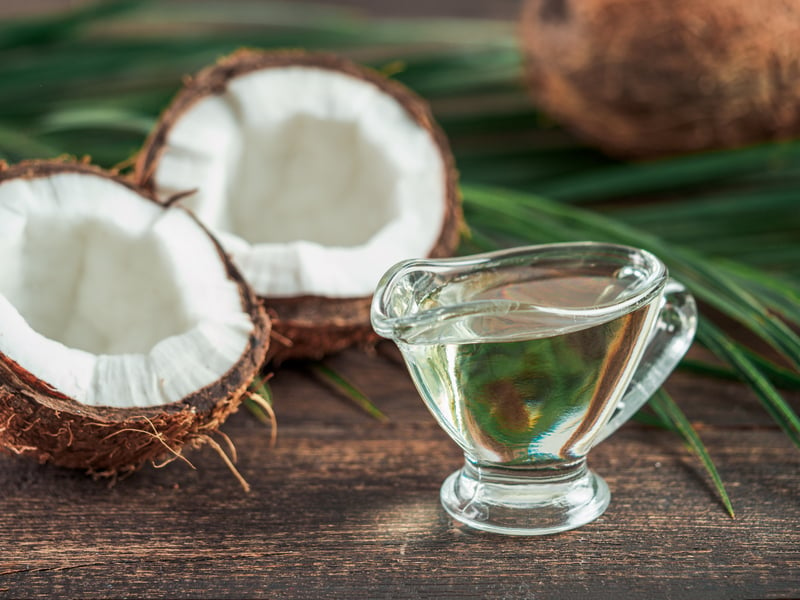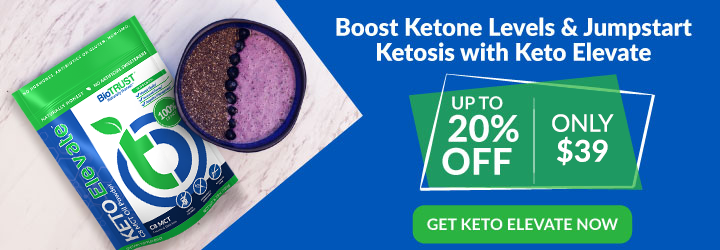MCT Oil: What is It + 8 Most Frequently Asked Questions

As the ketogenic diet has increased in popularity, so has MCT (medium-chain triglycerides) oil. This type of fat, however, is not new, and it’s not just for people following a keto diet. It’s believed to provide several unique benefits, including increased energy, improved satiety, and weight-loss support, which is why it’s also popular with athletes, bodybuilders, fitness enthusiasts, and dieters alike. 1
There are, understandably, a lot of questions about MCT oil and how it affects health. Here are the most frequently asked questions and what the research and experts have discovered about MCT oils.
In today’s article about MCT Oil, we address the following most popular questions:
- What is MCT Oil?
- What is MCT Oil Made Out Of?
- What Does MCT Oil Do?
- Does MCT Oil Break a Fast?
- How to Use MCT Oil
- Does MCT Oil Convert to Ketones?
- What is C8 MCT Oil?
- Does MCT Oil Have Any Side Effects?
- Is MCT Oil Right For You?
What is MCT Oil?
MCT oil is made up of medium-length chains of fats (i.e., triglycerides). Because of their chain length, these fats are more easily digested than fats with longer chains (long-chain fatty acids). In other words, MCT oils aren’t digested like other fats. Instead, they’re shuttled to and metabolized by the liver, where they become ketones, so they can then be converted into usable energy. 2 They also provide only seven calories per gram versus the nine calories per gram most fats provide.
MCT oil has become a popular supplement for helping support appetite reduction, weight loss, improved energy levels, and other potential benefits. 1, 3
There are four different types of MCT oil:
- C6 or caproic acid, which has 6 carbon atoms
- C8 or caprylic acid, which has 8 carbon atoms
- C10 or capric acid, with 10 carbon atoms
- And C4 or lauric acid, which has 12 carbon atoms and tends to behave more like a long-chain triglyceride and is digested more like other saturated fats than MCTs
Specific types have differing effects, with C10 and C8 being the most commonly used for the previously mentioned benefits.
MCT oil is often used by people following the keto diet as it helps the body transition to burning fat over glucose for energy. Again, however, it’s not only used by folks on a keto diet. Athletes also use it as a quick, high-quality fuel to support performance. 4
Compared to long-chain fatty acids, MCT oils take less effort for the body to break the carbon bonds. The smaller MCT links may also move through cell membranes more easily. So, they’re easier for our bodies to use without consuming enzymes to help digest them.
What is MCT Oil Made Out Of?
While MCT oil is typically found in coconut oil, palm oil, or dairy fats, it shouldn’t be confused with these types of foods. For instance, only 50% of the fat found in coconut oil is medium-chain, so the 2 types of fats aren’t interchangeable, despite some marketing claims. MCT oil supplements are often extracted from coconut oil, but these products can provide up to 100% MCT oils. Coconut oil contains ~90% saturated fat. 5
What Does MCT Oil Do?
There are many reasons people use MCT oil. One reason these oils have gained popularity is that they’re easier to digest than other types of fat, which is especially helpful for people who have a difficult time absorbing nutrients.
Here are some of the many things that MCT oil does to support overall health:
• May promote weight loss and improve weight management: One of the most popular reasons to use MCT oil is to help support weight loss as it’s been shown to increase two hormones known to support satiety: peptide YY and leptin. 6 It’s also been shown to help reduce food intake. 7
Research has found that overweight men using MCT oils burned more calories than those who don’t. 6 Other research has found that MCT oil helps suppress appetite and improve satiety compared to longer-chain fats, which may again help support weight loss. 8 Research also suggests that MCT oil consumption may help promote fat burning, potentially leading to decreased body fat storage. 9 – 11
In addition, MCT oils provide around 10% fewer calories than similar long-chain fats found in avocados, nuts, or olive oil. It may also help support a healthy gut by optimizing good bacteria and supporting gut lining, which are also important aspects of maintaining a healthy weight. 1
• May increase energy and endurance: Some research suggests consuming MCT-containing foods helps suppress lactate concentration during moderate- and high-intensity exercise. It’s also been shown to increase time to exhaustion and improve exercise endurance. 12, 13 For example, one study found that athletes given 6 grams of MCT oils before a cycling session found the session easier due to lower lactate levels compared to another group given longer chain fatty acids. 12 The researchers also found that when MCT oil was taken before exercise, the body more readily burned fat over carbohydrates.
Some animal research shows that MCT oils may also help increase physical resilience to stress (i.e., cold). 14 These effects are promising for enhancing performance levels during exercise and for athletes. However, not all research is as promising, with some research indicating minimal improvements. 15
• May support brain health: The brain uses a lot of energy to function. Research has found that thinking ability may increase when the brain taps into ketones for energy over glucose, especially for people with certain conditions that affect memory like Alzheimer’s. 16, 17 Other research indicates MCT oils may provide benefits for those with epilepsy or autism, though more research is needed. 18 – 21
• May support heart health: This claim is a bit more controversial as there are studies that show MCT oil can lower LDL (bad) cholesterol and improve HDL (good) cholesterol, which may support heart health. 22, 23 It has also been shown to help reduce waist circumference, which is often tied to heart health. 24 Further, MCT oil has been shown to help lower C-reactive protein, a key marker for the risk of heart disease. 25
On the other hand, MCT oils are considered a type of saturated fat, which may slightly increase triglyceride levels, and some research indicates it does not affect cholesterol levels. 26
• May help reduce the risk of metabolic syndrome: Because of its potential role in improving blood sugar levels and improving insulin sensitivity, MCT oil may help reduce the risk of diabetes and other metabolic syndromes. 27 Due to its effects on fat storage and burning, it may even help manage healthy blood sugar levels. 28
Does MCT Oil Break a Fast?
MCT oil contains calories (7 per gram or around 60 calories per serving), so consuming MCT oil will break a fast. That said, if you are Intermittent Fasting and your goal is to remain in ketosis (burning fats rather than glucose), then MCT oil may make the fasting window easier to tolerate, so you can avoid eating foods for longer. It may also help the body get into ketosis and support your metabolic flexibility to potentially improve your results. MCT oil may also help reduce fatigue, hunger, and brain fog during a “fasting” window.
If you consume MCT oil near the end of your fasting window, it may also help decrease your risk of overeating due to excess hunger, helping you better keep calories under control during your eating window.
One popular time to take MCT is with coffee or tea first thing in the morning. This technically breaks a fast, but it can also help extend a fasting window into later in the morning or early afternoon without affecting blood sugar levels.
How to Use MCT Oil
MCT oil is found in various amounts in several foods, including dairy foods like milk, butter, yogurt, and cream; coconut oil, cream, and meat; and palm kernel oil. MCT oil is also available in powder, liquid, and capsule forms as supplements. Powdered 100% MCT oil is perhaps the most versatile and convenient as it can be added to drinks like coffee, tea, or smoothies, as well as added to a wide range of recipes, even baked goods.
Most studies used between one and five tablespoons of MCT oil per day. However, if you have never used MCT oil before, it’s a good idea to start slowly (say, with one to two teaspoons) and build up over time to see how your body responds.
BREAKING: US Doctor: “Eating This Every Day Can Snap You into Ketosis”
Does MCT Oil Convert to Ketones?
Yes, ketones are created by breaking down fats when carb intake is limited. So, for folks following a ketogenic, low-carb, high-fat diet, MCT oil may help them stay in the fat-burning ketosis state. 29
What is C8 MCT Oil?
While we hate to pick favorites, C8 or caprylic acid, rises to the top of medium-chain triglycerides. Because of its shorter length, it’s easy to digest, absorb, and process, so it leads to fast, readily available energy. C8 is also more readily converted to ketone bodies, even for those who aren’t following a ketogenic diet. Finally, it’s also less likely to be stored in the liver or to lead to stomach upset.
Does MCT Oil Have Any Side Effects?
MCT oils are safe in small amounts as long as you have a healthy heart and liver. 30 And they appear to have many benefits. Dosage, however, is also important as MCT oils are high in saturated fats. The American Heart Association recommends, for example, that saturated fats be limited to around 6% or around 13 grams if consuming around 2,000 calories per day. 31
Another concern is that high amounts of MCT oil could build up in the liver over the long term. One animal study found that fat in the liver increased when 50% of the fats came from MCT oils. However, in this same animal study, the MCT oils were found to decrease total body fat and improve insulin resistance. 32
One seeming contradiction is that while MCT oils may help some people feel fuller for longer due to the release of hunger-fighting hormones, it may also increase hormones (e.g., ghrelin and neuropeptide Y) that promote hunger in some people. 33, 34 This may depend on the person, their individual circumstances, or the amount consumed. The effects of these hormone fluctuations clearly need more research.
Some individuals may also experience minor stomach upset, including nausea, cramping, or diarrhea. Usually, however, these side effects can be avoided by starting with smaller amounts of MCT oil (such as a teaspoon) and slowly increasing to the preferred amount.
Is MCT Oil Right For You?
MCT oil has a variety of potential benefits, including reducing appetite, supporting greater weight loss, or improving energy levels, endurance, and gut health. It may, however, not be right for everyone. If you are concerned with blood lipid levels, it may be worth discussing this option with your preferred healthcare practitioner.
There’s no magical nutritional elixir that works well for everyone, but when combined with a well-balanced diet and consistent exercise plan, MCT oil may provide an edge to help you realize your goals—whether that includes sticking to a ketogenic lifestyle, losing body fat, enhancing energy levels, or promoting focus and clarity.








